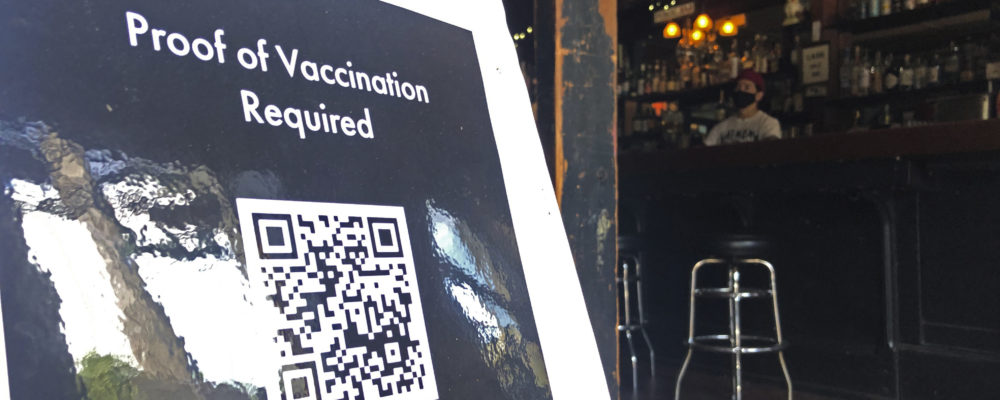“Forced medical procedures must be one of the most egregious violations of a person’s physical and psychological integrity against the will of an individual.”
Most Canadians, whether constitutional lawyers or not, recognize truth in this holding of Justice Ian Binnie in A.C. v. Manitoba. The violation of personal integrity is aggravated when, as in A.C., a strong religious belief is the basis of an objection to medical treatment.
But what about society’s interests? The number of Canadians vaccinated against COVID-19 may be insufficient to guarantee a return to normal life. An obvious way to encourage higher vaccine take-up is restricting the liberty, including taking away the jobs, of the unvaccinated. But with few, if growing exceptions, politicians, as well as other decision-makers such as university presidents and business leaders, have been reluctant to pursue this route.
MORE SIGNAL. LESS NOISE. THE HUB NEWSLETTER.
Central to their hesitation are concerns, in the vein of Justice Binnie’s, about vaccine mandates’ legality. These concerns are not fanciful.
But this legal grey zone can become black-and-white. Governments can pass legislation, regulating use of vaccine mandates, noting where they are to be: mandatory (e.g., staff front-line heath care, elementary schools); permitted (most places); and prohibited (e.g., customers at grocery stores, pharmacies). Exceptions should, of course, be made for those who cannot be vaccinated, such as if they are too young, undergoing chemotherapy, or are otherwise immuno-compromised.
And this legislation should be crafted by invoking section 33 of the Canadian Charter of Rights and Freedoms, also known as the “notwithstanding clause”.
The Legal Grey Zone
Concerns that vaccine mandates are unconstitutional may be overstated. Law professors Debra Parkes and Carissima Mathen have recently persuasively argued that restricting individuals from attending a university campus unless they are vaccinated would not violate the Charter. The Charter only applies to “government”.
Whether this includes universities is unclear. More importantly, they suggest that rights to liberty or security of the person would be limited in accordance with the principles of fundamental justice, meaning s. 7 of the Charter, which protects those rights, would not be limited.
Alternatively, and even more persuasively, they observe that all rights in the Charter (including rights to freedom of conscience and religion, cited as reasons for refusing to be vaccinated) can be limited if “demonstrably justified in a free and democratic society”.
Indeed, Justice Binnie was unable to persuade his colleagues in A.C. that the unwanted blood transfusion in that case violated the Charter, albeit only because the person was a minor.
But the devil is in the details. My colleague Brandon Trask has viewed the constitutionality of vaccine passports with skepticism. The right of adults of sound mind to refuse medical treatment existed in the common law before being constitutionalized in s. 7 of the Charter, even putting aside religious freedoms.
A majority of the Supreme Court of Canada has never found a limit on s. 7 rights to be justified. To be sure, in a leading s. 7 case, Justice Antonio Lamer suggested that limits on s. 7 could be justified in emergencies, including “epidemics.” And courts have been very deferential to policy-makers in emergencies in general, and the COVID-19 pandemic in particular. Even so, we are in unchartered waters.
The argument that the right not to be subject to unwanted medical treatment would not be infringed because no one would be forced to take the vaccine, but rather have their liberty restricted, is similarly detail-dependent. “Take the vaccine or go to prison” is a “choice”, but not one that a court would likely hold to be constitutional. “Take the vaccine or you cannot go to a Blue Bombers game” (as is currently the case in Manitoba) is at the opposite end of the spectrum.

Where does “take the vaccine or lose your job, and thus your livelihood and a large part of your identity” land on this spectrum? Here, the answer is less certain. It is likely permissible to mandate that a critical care nurse be vaccinated upon pain of losing his job, given his interaction with the most vulnerable.
But would this also be true for a park conservation officer, who rarely interacts with individuals and, when she does, typically is outdoors (where the risk of COVID-19 spreading is minimal)? How the courts will balance her acute interests in bodily integrity upon pain of losing her livelihood, against a small risk of infecting a colleague, is very uncertain.
Prime Minister Trudeau’s recent announcement that the civil service is examining vaccines mandates for federal employees and those in federally regulated industries implicitly acknowledges nuance here.
The legal grey zone of vaccine mandates is complicated not just by the context-specific nature of Charter analysis, but by provincial human rights and privacy legislation that apply to private parties as well as governments. The details of these laws vary from province-to-province, muddying the waters further. And there is evidence that vaccine mandates would disproportionately impact certain racial and/or religious groups, potentially putting statutory and constitutional equality rights in play.
This legal grey zone has led many decision-makers to be reticent to mandate vaccination. This is understandable. How many employers and businesses want to end up in litigation? Even if they “win,” the cost, delay, and stress are themselves disincentives to act.
Enter the Notwithstanding Clause
The “notwithstanding clause” in the Charter allows legislatures to temporarily override Charter rights, or at least judicial interpretations of those rights. This is controversial in some circles, largely because it leaves the judiciary powerless in the face of legislative majorities subordinating minority rights (see Quebec’s Bill 21).
However, it can be defended as the part of the constitution that protects parliamentary supremacy. “Judges do not have a monopoly on constitutional wisdom” and the boundaries of the Charter’s meaning are a matter for reasonable disagreement. And but for the clause’s inclusion, the Charter never would have been enshrined.
Those across the political spectrum, but particularly small-c conservatives (in power in seven of ten provinces), should be particularly keen to take this route of legislation invoking s. 33 regarding vaccine mandates.
Most importantly, using the notwithstanding clause (in legislation also temporarily overriding other human rights and privacy statutes) eliminates legal uncertainty that is seemingly causing so much reticence to act. This would tell, for example, university presidents, in no uncertain terms, that they have authority to mandate vaccines on campus, allowing them to make decisions in the best interests of their staff and students without fear of litigation.
As Cass Sunstein among others have noted, legal uncertainty tends to particularly concern conservative jurists.
Moreover, legislation allowing businesses to mandate vaccines allows them to decide how to balance the interests of the vaccine-resistant against the needs and demands of their clientele. There may be some circumstances (such as front-line healthcare and elementary school staff) where the government should put its foot down as the risk to vulnerable and/or unvaccinated populations is too great.
There may be others (such as customers at grocery stores and pharmacies) where imposing a vaccine mandate should be prohibited as it would further impede the vaccine-resistant’s ability to live healthily. But having the “default” be choices of individual businesses and workplaces respects local autonomy and allows businesses to tailor their practices to their particular clientele and work force.
Using the notwithstanding clause can also demonstrate that legislatures, as much as courts, can interpret the Charter’s meaning, frequently a matter of reasonable disagreement. Explaining why s. 33 is being used — easy, in this context, given the possible dangers of disagreement on Charter interpretation — also better allows the public to judge the wisdom of using it and hold politicians accountable accordingly. Mark Mancini and Geoffrey Sigalet suggested as much last year.
Using s. 33 might be concerning to those who view the clause as illegitimate and are reluctant to normalize its use. Its use may also be objected to as unnecessary given plausible arguments that limits on Charter rights posed by vaccine mandates would be justifiable.
These were reactions to New Brunswick’s 2020 proposal to mandate vaccines in schools using s. 33. These are respectable viewpoints. But their consequence is that any vaccine mandate would be enacted in a legal grey zone — a grey zone that may lead to a lack of vaccine mandates.
In any event, concerns about normalization of the use of s. 33 should be less acute in this unique situation. Even critics arguing for constraints on its use, such as the International Commission of Jurists, have suggested that it would be permissible in “an emergency or [for] an overwhelming public purpose.”
Such constraints are unlikely legal requirements given the clear language of s. 33, and past judicial decisions interpreting it. Even so, the circumstances of a once-in-a-century pandemic would seem to satisfy even these critics.
Some libertarians may continue to have extra-legal, philosophical objections to vaccine mandates. But legislation, using the notwithstanding clause, would at least eliminate doubts about legality.
This would not just reduce inaction due to fear of litigation, but allow most businesses and employers to make decisions without fear of litigation, and demonstrate the role of legislatures in constitutional interpretation.




